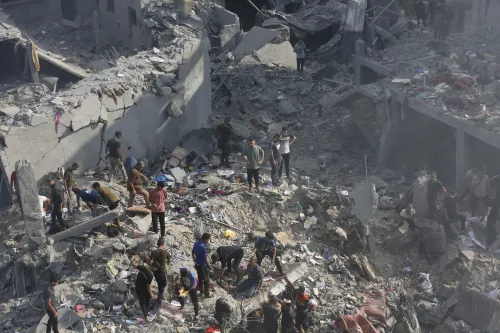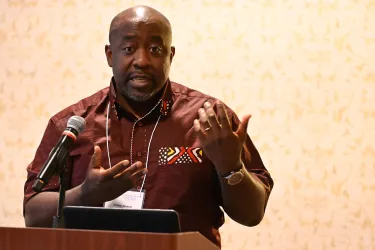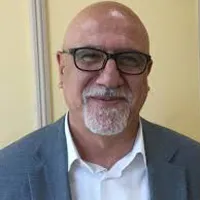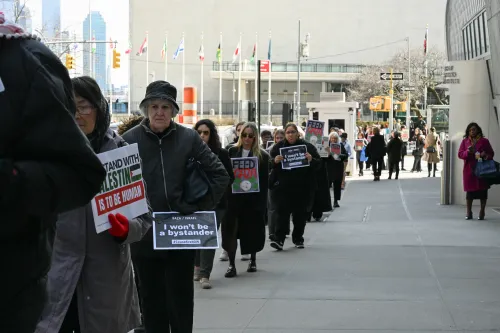Gazans hungry and desperate as Israel-Hamas war continues
‘The needs are massive and the obstacles are staggering’

Editor's note: This story was written before the ongoing conflict between Israel and Iran. To read about those strikes, go here.

LOUISVILLE — A humanitarian crisis is unfolding in Gaza where Palestinians are being pushed to the brink of starvation, and beyond, during the protracted war between Israel and Hamas that has left families desperate and children malnourished.
In recognition of the crisis, the United Nations General Assembly met in emergency session on June 12 and passed a resolution demanding an immediate, unconditional and lasting ceasefire. The resolution also condemned the use of starvation as a weapon of war and demanded that Israel fully drop its aid blockade. The U.S. and Israel were among just 12 member states that rejected the resolution, which received nearly 150 favorable votes.
In May, the World Health Organization reported that the risk of famine in Gaza was increasing as a result of the “deliberate withholding” of food and other humanitarian aid.
“The entire 2.1 million population of Gaza is facing prolonged food shortages, with nearly half a million people in a catastrophic situation of hunger, acute malnutrition, starvation, illness and death,” the WHO stated. “This is one of the world’s worst hunger crises, unfolding in real time.”
Similar warnings have come from UN Secretary-General António Guterres, who recently said the people of Gaza were enduring what might be the cruelest phase of the war.
A June 5 Humanitarian Situation Update noted that more than 2,700 children under age 5 were diagnosed with acute malnutrition in the second half of May, “a sharp deterioration.”
“Families are being starved and denied the very basics, all with the world watching in real time,” Guterres said in a news conference on May 23.

The Rev. Jihyun Oh, Stated Clerk of the PC(USA) General Assembly and the Executive Director of the Interim Unified Agency, said, “The current situation is heartbreaking, and I imagine it breaks the heart of God to see those created in God’s image suffer in this way.”
Though some aid has been able to trickle in recently, “all the aid authorized until now amounts to a teaspoon of aid when a flood of assistance is required,” Guterres said. “The needs are massive and the obstacles are staggering. Strict quotas are being imposed on the goods we distribute, along with unnecessary delay procedures,” and the risk of security incidents and looting remains high after months of blockade.
All of that — along with the lack of a permanent ceasefire — is of grave concern to Presbyterians and some partners of the Presbyterian Church (U.S.A.).
In multiple Action Alerts, the Presbyterian Office of Public Witness has spoken out against inhumane treatment of Palestinians by Israel. (Register for an upcoming webinar here.)
“The humanitarian catastrophe in Gaza is a direct result of Israel’s ongoing military campaign — which has also extended into the West Bank and across the wider region — and which Prime Minister Netanyahu has vowed to continue ‘with full force,’” OPW stated in a May 15 Action Alert. “Both the war and the blockade must end immediately.”

Valery Nodem, associate for International Hunger Concerns for the Presbyterian Hunger Program, said the threat of famine has been looming since the beginning of the war. “It is heartbreaking anytime we see famine in countries affected by civil conflicts. It is a lot harder to see it when food and medicine are sitting and rotting at the border while people are dying.”
Nodem said Gaza “should get the food and medicine it needs without any condition, and the international community should continue the calls to ensure that food in no circumstances be ever integrated into military strategies as a weapon of war.”
Rifat Kassis, general coordinator of Kairos Palestine, a PC(USA) partner stressed the need for people of faith to start “standing now with the hungry, the bombed, the besieged” in Gaza.

“If we fail to act, it is not only Gaza that is lost but our own humanity, and the integrity of the entire international system" is at stake, Kassis said. “We are called, urgently and without excuse, to break this silence with truth and resistance."
Just a few days ago, the UN reported that the average Gazan’s daily caloric intake is now well below what the human body needs to survive.
PC(USA) partner B’Tselem — The Israeli Information Center for Human Rights in the Occupied Territories — shares the impact on families through testimonials on its website.
Abdallah Shaqurah, a 40-year-old widower and father of three from Khan Yunis, said, “My children beg me to get them meat or eggs, and I have to tell them there is none and I can’t. What crime have my children committed? Why must they starve?”
Another parent, Anwar Hamad, a 38-year-old mother of six from Jabalya Refugee Camp, stated, “The hunger we’re experiencing now is the worst we have faced since the war began. It’s destroying us. We all wander around weak and thin. … I long to bring home a potato or an eggplant!”
The World Food Program reported May 22 that a handful of bakeries in south and central Gaza had resumed operation after dozens of trucks were finally able to collect the necessary cargo.
WFP Country Director Antoine Renard stressed, “We are in a race against time to prevent widespread starvation. … Humanitarian agencies require immediate, unrestricted, and safe access to flood Gaza with lifesaving aid. This is the only way to avert an entirely preventable disaster.”
In early June, CNN reported that dozens of Palestinians were killed when Israel military opened fire near an aid distribution site in southern Gaza. It was just one example of Palestinians losing their lives while seeking aid from the U.S.-backed Gaza Humanitarian Foundation, whose distributions of aid have been accompanied by “chaos and violence,” the news outlet noted. Such incidents have continued.
Access to hospitals also has been an issue. Some have been attacked and key facilities are at risk of becoming nonfunctional.

Even before the current crises in Gaza, the PC(USA) was advocating for justice and peace in the region.
The General Assemblies of the PC(USA) and its predecessor denominations have been vocal advocates of human rights since the 1930’s, with the first official policy of support for the UN Universal Declaration of Human Rights coming in 1949 from the PCUSA (northern church), according to Oh.
The 1978 PCUS (southern church) Declaration of Human Rights affirmed, among other things, every human’s right to basic subsistence, including “adequate work, food, clothing, and shelter ...,” Oh noted.
“All of this has been under threat in Gaza, but most alarming in this moment is the threat to adequate food,” she stated. “Our statements have been consistent in recognizing that our support of human rights, including the right to adequate food especially when food is available, comes from our theological and biblical recognition of the image of God in every person, including Palestinians.”
In 2022, the 225th General Assembly of the PC(USA) voted 266-116 to approve INT-02, an affirmation that the denomination “recognizes that the laws, policies, and practices of the government of Israel regarding the Palestinian people fulfill the international legal definition of apartheid.”
The overture also urged members, congregations, presbyteries, and national staff units “to seek appropriate ways to bring an end to Israeli apartheid.”
An opportunity for advocacy: Join the next Presbyterian Advocacy Hour to learn how to engage in faithful, effective advocacy that upholds human rights and the hope of peace. The online program will be at noon June 25. You can register here.
Find additional information about resources and General Assembly policy on Gaza on the PC(USA) Israel-Palestine page. PC(USA) Action Alerts can be found here.
Also, learn about the World Council of Churches' recent Stop the Annexation campaign here and consider becoming a part of WCC’s Ecumenical Accompaniment Program in Palestine and Israel.
You may freely reuse and distribute this article in its entirety for non-commercial purposes in any medium. Please include author attribution, photography credits, and a link to the original article. This work is licensed under a Creative Commons Attribution-NonCommercial-NoDeratives 4.0 International License.




